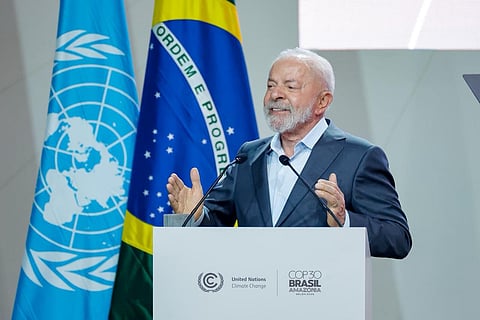

The 30th Conference of the Parties (COP30) to the United Nations Framework Convention on Climate Change (UNFCCC) in Belem, Brazil, began November 10, 2025. Here’s a look at what happened on the second day of COP30. Also read the diary for November 10, November 12, November 13, November 14, November 17, November 18, November 19, November 20, November 21.
In the Presidential Consultations on the four issues, India, for Like-Minded Developing Countries (LMDCs), called for a three-year work program (till 2028) on Article 9.1 (relates to the obligations of developed countries to provide finance to developing countries). A mere “call” is not enough, and it does not allow for further discussion in a dedicated manner, it said. Further, on including the synthesis of nationally determined contributions (NDCs) in the agenda, India said there is already a process for it and reiterated its work program proposal saying that finance is central to the issue of NDCs.
The proposed mechanism, the group explained, would serve as an institutional arrangement under the UNFCCC to coordinate finance, technology transfer, and capacity-building support across national and international levels — translating just transition from principle to practice.
India, for LMDCs and BASIC (Brazil, Africa (South Africa), India, and China), reaffirmed Common but Differentiated Responsibilities and Respective Capabilities and urged developed countries to meet finance obligations, prioritising adaptation and measurable Global Goal on Adaptation (GGA) outcomes. Tanzania called for predictable, grant-based finance and clear just transition pathways for Africa. Saudi Arabia sought cooperative, non-punitive approaches with emerging technologies and national Just Transitions. Uruguay opposed unilateral measures, urged finance-backed adaptation, and promoted inclusive, rights-based resilience.
Developing countries, led by the G77, pressed for stronger focus on Means of Implementation and grant-based public finance. Parties debated how to frame finance indicators, while agreeing indicators should remain flexible and not a conditionality on the access to finance. Talks also looked ahead to the post-Belem process and the Baku Adaptation Roadmap, and to refine and implement the 100 indicators across 11 thematic areas.
Around 44 countries endorsed the declaration. It calls on countries to invest in mitigation and prioritise adaptation, especially people-centered measures such as social protection, crop insurance, and other mechanisms that strengthen community resilience. These countries are committing to centre small holder farmers, fisher folk, pastoralists and indigenous people in climate action.